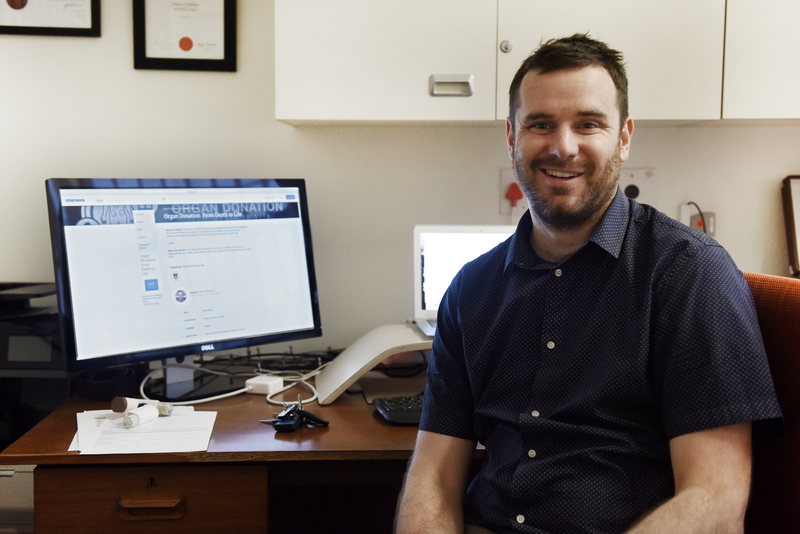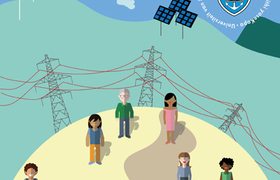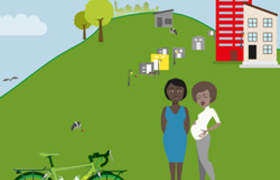Life-saving lessons on organ donation
03 August 2017 | Story Kate-Lyn Moore. Photo Robyn Walker.
The Centre for Innovation in Learning and Teaching (CILT) teamed up with critical-care specialist and transplant surgeon Dr David Thomson to produce a new massive open online course (MOOC) – Organ Donation: From Death to Life.
Perturbed by South Africa’s poor rates of deceased donation, Thomson was prompted to create the MOOC to educate health professionals on organ donation. He also hopes to counter troubling misnomers that may prove to be barriers to this life-saving process.
“We are lagging terribly behind,” he says. “Both in the public sector and the private sector. It is multifactorial with problems every step of the way.”
As of 2017, just 200 000 of 53 million South Africans are registered as organ donors. Being registered as an organ donor doesn’t always automatically mean that your organs will be donated, however.
“In South Africa being on the registry does not equate to consent – maybe it should. It merely empowers the discussion with your family,” he says. But when a family is approached for consent in times of crisis the default response is no.
The course covers the intricacies of the entire organ donation process, including the prerequisites of informed consent and the dead donor rule.
The course also includes historical context on donation, the preconditions for determining brain death and assurances on how donors are treated by the donation team. It also counters misreported narratives, such as claims of brain-dead patients coming back to life, which may make it more difficult when asking for a family’s consent.
“Hopefully the MOOC will create ambassadors to spread the educated word about organ donation,” he says.
“We need more public awareness. The public can’t be thinking about this for the first time when they are acutely grieving. There needs to be national buy-in – widespread public support – for this life-saving procedure, which, in my opinion, reflects on how well your health system is working.”
Creating a better system
UCT and Groote Schuur is an excellent working, teaching and training environment, he says. (He has worked at the hospital since 2002 and is currently based in the Department of Critical Care and Department of Surgery.) But there is no course focused on organ donation, apart from a scattering of undergraduate lectures.
“Putting the course together gives a resource for students and healthcare workers to see the whole picture. Good end-of-life care, compassionate family discussions and understanding of the organ donation system and understanding the ethical issues will lead to a much better system.
“I firmly believe that with a better understanding of all that is involved, we can greatly improve the number of lives saved by transplantation.”
The course is not only focused on South Africa, however. In demonstrating how various organ donation systems function around the world, Thomson hopes to highlight the many ways the South African system can be improved.
“I am convinced online education, where learners can control their pace of learning, is an incredible platform to increase the reach of education efforts.”
Training compassionate communicators
There are multiple factors impacting organ donation rates across the world. These are difficult to quantify, and they range from culture to religion, location and access to resources.
Organ donation comes with stigma in many contexts. It is extremely important that doctors are aware of and sensitive to these factors when interacting with grieving families.
It is very difficult to formally assess how sensitive and effective a communicator a healthcare practitioner is, explains Thomson.
“But low organ donation consent rates maybe reflect that we are not good at this and have room for improvement.”
“Every time we don’t get it right, an opportunity for potential donation may be missed.”
Making the request for organ donation is exceptionally difficult, Thomson notes. It is essential that they are given training to deal with the family, and communicate effectively about the end of life.
“Doctors are generally poor at this aspect of their jobs. Planning realistically cannot be understated from the family side and healthcare side,” says Thomson.
“Everyone does still die. But we seem to like to put our head in the sand and let events overtake us. Who decides on what quality of life you would find acceptable if you were head injured and on a ventilator with a poor prognosis?”
End-of-life decisions are complicated. Organ donation would seem to complicate matters further. This is why it is essential for registered donors to discuss their wishes with their family members, asserts Thomson.
“Every time we don’t get it right, an opportunity for potential donation may be missed. A single donor can save up to 10 lives. Up to 60 lives can be profoundly altered by tissue donation. And a donor’s family can find great solace from the fact that their tragedy has helped others immeasurably.”
The course begins on Monday, 31 July, and will be running monthly.
It is accredited for 30 continuing education units (CEUs), five of which are for ethics. These units count towards the annual requirements of the continuing professional development programme for healthcare professionals.
 This work is licensed under a Creative Commons Attribution-NoDerivatives 4.0 International License.
This work is licensed under a Creative Commons Attribution-NoDerivatives 4.0 International License.
Please view the republishing articles page for more information.











